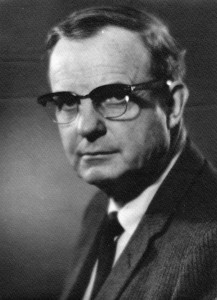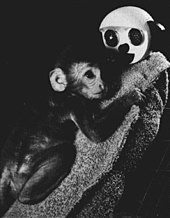
Back هاري هارلو Arabic هری هارلو AZB Harry Frederick Harlow Catalan Harry Harlow Czech Harry Harlow German Harry Harlow Spanish Harry Harlow Estonian هری هارلو Persian Harry Harlow Finnish Harry Harlow French
Harry F. Harlow | |
|---|---|
 Harlow, c. 1968 | |
| Born | Harry Frederick Israel October 31, 1905 Fairfield, Iowa, U.S. |
| Died | December 6, 1981 (aged 76) Tucson, Arizona, U.S. |
| Resting place | Forest Hill Cemetery |
| Alma mater | Stanford University |
| Spouses | Clara Mears
(m. 1932; div. 1946)Clara Mears (m. 1972–1981) |
| Awards | National Medal of Science (1967) Gold Medal from American Psychological Foundation (1973) Howard Crosby Warren Medal (1956) |
| Scientific career | |
| Fields | Psychology |
| Doctoral advisor | Lewis Terman |
| Doctoral students | Abraham Maslow, Stephen Suomi |

Harry Frederick Harlow (October 31, 1905 – December 6, 1981) was an American psychologist best known for his maternal-separation, dependency needs, and social isolation experiments on rhesus monkeys, which manifested the importance of caregiving and companionship to social and cognitive development. He conducted most of his research at the University of Wisconsin–Madison, where humanistic psychologist Abraham Maslow worked with him for a short period of time.
Harlow's experiments were ethically controversial; they included creating inanimate wire and wood surrogate "mothers" for the rhesus infants. Each infant became attached to its particular mother, recognizing its unique face. Harlow then investigated whether the infants had a preference for bare-wire mothers or cloth-covered mothers in different situations: with the wire mother holding a bottle with food, and the cloth mother holding nothing, or with the wire mother holding nothing, while the cloth mother held a bottle with food. The monkeys overwhelmingly chose the cloth mother, with or without food, only visiting the wire mother that had food when needing sustenance.
Later in his career, he cultivated infant monkeys in isolation chambers for up to 24 months, from which they emerged intensely disturbed.[1] Some researchers cite the experiments as a factor in the rise of the animal liberation movement in the United States.[2] A Review of General Psychology survey, published in 2002, ranked Harlow as the 26th most cited psychologist of the 20th century.[3]
- ^ Harlow, H. F.; Dodsworth, R. O.; Harlow, M. K. (June 1965). "Total social isolation in monkeys". Proceedings of the National Academy of Sciences of the United States of America. 54 (1). Proceedings of the National Academy of Sciences: 90–97. Bibcode:1965PNAS...54...90H. doi:10.1073/pnas.54.1.90. ISSN 0027-8424. PMC 285801. PMID 4955132.
- ^ Blum, Deborah (2002). Love at Goon Park: Harry Harlow and the Science of Affection. Perseus Publishing. p. 225.
- ^ Haggbloom, Steven J.; Powell, John L. III; Warnick, Jason E.; Jones, Vinessa K.; Yarbrough, Gary L.; Russell, Tenea M.; Borecky, Chris M.; McGahhey, Reagan; et al. (2002). "The 100 most eminent psychologists of the 20th century". Review of General Psychology. 6 (2): 139–152. CiteSeerX 10.1.1.586.1913. doi:10.1037/1089-2680.6.2.139. S2CID 145668721.